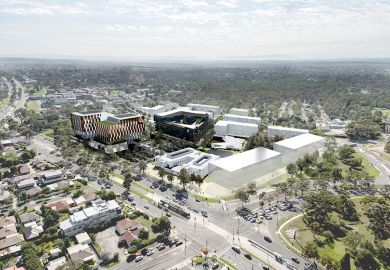The University of Melbourne has joined the ranks of Australian institutions leveraging the intrinsic value of their land, by conscripting a global investment company to buy, fund and manage its new student accommodation.
Under a 42-year concession agreement, investment managers AMP Capital will bankroll the university’s acquisition of the 527-bed facility from student accommodation development company Urbanest.
The residence, which is reserved for postgraduate students and visiting academics, is part of the Melbourne Connect innovation precinct taking shape on the site of the old Royal Women’s Hospital, adjacent to the university and just a few blocks from Melbourne’s central business district.
The upfront payment from AMP Capital will also cover the completion of the residence’s construction ahead of its scheduled opening for the first semester of 2021. The company will also assume responsibility for repairs and maintenance. In return, it will collect rental income over the life of the agreement.
The deal puts the company in charge of almost 1,500 Melbourne beds, after it signed a 40-year agreement last November to manage two other residential blocks on the university’s Parkville campus.
Under the model, the university manages tenancies and bears responsibility for residents’ pastoral care.
Melbourne Connect will also host industry partners, shops, childcare and an events space along with the university’s engineering school, the Melbourne Entrepreneurial Centre and Science Gallery Melbourne. Property giant Lendlease is developing, building, co-financing and managing the precinct’s commercial space.
The concession resembles arrangements being struck by other universities in Australia and elsewhere. Perth’s Curtin University has contracted a commercial consortium to design, finance and build a campus development featuring student accommodation, a hotel, apartments, shops and commercial space. The group will operate the precinct for 35 years before handing ownership back to Curtin.
The University of Oxford has looked even further into the future, contracting the UK’s biggest investment manager to invest billions of pounds in building thousands of homes and two science parks on university-owned land. Legal & General will collect rent on the buildings for 60 years before Oxford resumes possession.
Australia’s Western Sydney, La Trobe and Flinders universities have pursued similar strategies to finance new campus facilities. In a plan unveiled last month, Queensland’s Griffith University flagged plans to offload a campus in Brisbane’s south to help pay for major expansions including a new campus on the CBD’s fringe.
Register to continue
Why register?
- Registration is free and only takes a moment
- Once registered, you can read 3 articles a month
- Sign up for our newsletter
Subscribe
Or subscribe for unlimited access to:
- Unlimited access to news, views, insights & reviews
- Digital editions
- Digital access to THE’s university and college rankings analysis
Already registered or a current subscriber?










